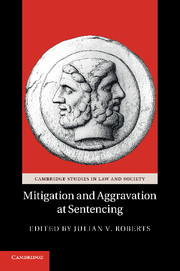Book contents
- Frontmatter
- Contents
- Tables
- Contributors
- Foreword
- Acknowledgments
- Chapter one Punishing, more or less
- Chapter two Re-Evaluating the Justifications for Aggravation and Mitigation at Sentencing
- Chapter three The Search for Principles of Mitigation
- Chapter Four Personal Mitigation and Assumptions about Offending and Desistance
- Chapter Five Intoxication as a sentencing factor
- Chapter Six Beyond the Partial Excuse
- Chapter Seven Equality before the law
- Chapter Eight Personal mitigation
- Chapter Nine Exploring Public Attitudes to Sentencing Factors in England and Wales
- Chapter Ten The Pernicious Impact of Perceived Public Opinion on Sentencing
- Chapter Eleven Addressing Problematic Sentencing Factors in the Development of Guidelines
- Chapter Twelve Proof of Aggravating and Mitigating Facts at Sentencing
- Chapter Thirteen Mitigation in Federal Sentencing in the United States
- Chapter Fourteen The discretionary effect of mitigating and aggravating factors
- Index
- References
Chapter two - Re-Evaluating the Justifications for Aggravation and Mitigation at Sentencing
Published online by Cambridge University Press: 07 September 2011
- Frontmatter
- Contents
- Tables
- Contributors
- Foreword
- Acknowledgments
- Chapter one Punishing, more or less
- Chapter two Re-Evaluating the Justifications for Aggravation and Mitigation at Sentencing
- Chapter three The Search for Principles of Mitigation
- Chapter Four Personal Mitigation and Assumptions about Offending and Desistance
- Chapter Five Intoxication as a sentencing factor
- Chapter Six Beyond the Partial Excuse
- Chapter Seven Equality before the law
- Chapter Eight Personal mitigation
- Chapter Nine Exploring Public Attitudes to Sentencing Factors in England and Wales
- Chapter Ten The Pernicious Impact of Perceived Public Opinion on Sentencing
- Chapter Eleven Addressing Problematic Sentencing Factors in the Development of Guidelines
- Chapter Twelve Proof of Aggravating and Mitigating Facts at Sentencing
- Chapter Thirteen Mitigation in Federal Sentencing in the United States
- Chapter Fourteen The discretionary effect of mitigating and aggravating factors
- Index
- References
Summary
In an important essay Julian Roberts has drawn attention to the paradox that aggravating and mitigating factors play a crucial role in sentencing, particularly in terms of quantum and around the custody threshold, and yet ‘most guideline systems around the world adopt a laissez-faire approach’ to these factors (Roberts 2008a: 274). Sentencing statutes or guidelines may list the relevant factors, and may even group them, but only rarely do they provide any guidance as to the relative weight of those factors or as to the impact they should have on sentence. The role of aggravating and mitigating factors is therefore left largely without structure, unbridled and untamed, a tendency that undermines the rationale of sentencing guidelines in providing common starting points and shared standards. It may also impair public understanding of sentences handed down by the courts.
- Type
- Chapter
- Information
- Mitigation and Aggravation at Sentencing , pp. 21 - 39Publisher: Cambridge University PressPrint publication year: 2011
References
- 9
- Cited by

